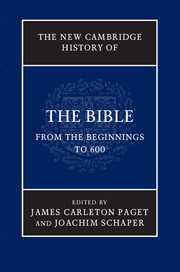Book contents
- The New Cambridge History of The Bible
- Series page
- The New Cambridge History of The Bible
- Copyright page
- Contents
- Figures
- List of contributors
- Preface
- Abbreviations
- Abbreviations of books of the Bible
- Table of Psalm numbering
- Part I Languages, writing systems and book production
- Part II The Hebrew Bible and Old Testaments
- 5 The Old Testament text and its transmission
- 6 The literary history of the Hebrew Bible
- 7 The Old Testament canons
- 8 The ‘apocryphal’ Old Testament
- 9 From inner-biblical interpretation to rabbinic exegesis
- 10 The Aramaic Targums
- 11 Scriptural interpretation at Qumran
- 12 The Septuagint
- 13 Biblical interpretation in Greek Jewish writings
- 14 Scripture in the Jerusalem temple
- 15 The political and legal uses of scripture
- 16 Modern editions of the Hebrew Bible
- Part III The New Testament
- Part IV Biblical versions other than the Hebrew and the Greek
- Part V The Reception of the Bible in the Post-New Testament Period
- Select bibliography
- Index of manuscripts
- Index of scriptural and related sources
- General index
15 - The political and legal uses of scripture
from Part II - The Hebrew Bible and Old Testaments
Published online by Cambridge University Press: 05 May 2013
- The New Cambridge History of The Bible
- Series page
- The New Cambridge History of The Bible
- Copyright page
- Contents
- Figures
- List of contributors
- Preface
- Abbreviations
- Abbreviations of books of the Bible
- Table of Psalm numbering
- Part I Languages, writing systems and book production
- Part II The Hebrew Bible and Old Testaments
- 5 The Old Testament text and its transmission
- 6 The literary history of the Hebrew Bible
- 7 The Old Testament canons
- 8 The ‘apocryphal’ Old Testament
- 9 From inner-biblical interpretation to rabbinic exegesis
- 10 The Aramaic Targums
- 11 Scriptural interpretation at Qumran
- 12 The Septuagint
- 13 Biblical interpretation in Greek Jewish writings
- 14 Scripture in the Jerusalem temple
- 15 The political and legal uses of scripture
- 16 Modern editions of the Hebrew Bible
- Part III The New Testament
- Part IV Biblical versions other than the Hebrew and the Greek
- Part V The Reception of the Bible in the Post-New Testament Period
- Select bibliography
- Index of manuscripts
- Index of scriptural and related sources
- General index
Summary
- Type
- Chapter
- Information
- The New Cambridge History of the Bible , pp. 345 - 364Publisher: Cambridge University PressPrint publication year: 2013
- 1
- Cited by



